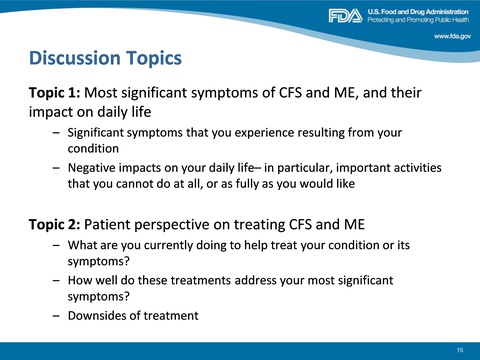


“There’s an unmet medical need right here and there has been for a long time” Bob Miller

Highlights
Five patients/advocates started off the meeting. There was an ex-emergency room doctor who was able to improve enough to work full time but still must sacrifice quality time with his family on the weekends to work on recovering from the week. There was Denise with her two formerly athletic young men, who, eight years after becoming ill now require 24/7 care despite trying a long, long list of pharmaceuticals. (Their heart rate at rest is over 110 bpm.) There was Mary Dimmock talking about her now mostly housebound son who not too long ago was backpacking through Asia – by himself. There was the linguist in the seventh year of his two year Master’s program who had trouble speaking and was too cognitively challenged to even consider a career in his field.
“I have a very small life” quotation from CFIDS Association Survey
There was outgoing CFIDS Association CEO, Kim McCleary, reporting that the CAA found that the average illness duration of the people taking their FDA survey was no less than 18 years and one person has had it for 70. The average age of onset is between 19-35, with 36-50 coming in a close second and 18 years or younger a strong third and then past 51 years of age. (Dr. Jason reported that the Chu/Jason FDA survey had really significant results; watch for a report on that tomorrow. )
There was Chris Williams, a former federal employee who’d managed 70 people, who now after early retirement, has to remind her husband that even the mundane tasks of daily life overwhelm her ability to multi-task.
In short, there was chronic fatigue syndrome in all it’s horrible glory…
Crashes
“My day is structured around this illness”…quotation from CFIDS Association FDA Survey

It became clear that ‘crashing’ is a very variable thing; some people crash for long periods and some for short periods; small things can make some people crash while others are more resilient.
What Helps
When asked what helped, Mary Dimmock described a long list of medications that didn’t help her formerly adventurous son, some that helped a bit (florinef and antifungals) and antibiotics (azithromycin/doxycycline) that worked great – for about six weeks – after which her son was back in bed again.

Ampligen – When FDA reps asked for patients experiences on Ampligen one person person who is now starting two practices said she couldn’t have even made to the meeting without Ampligen. Another person described, after being wiped out by a treadmill, dancing out of the doctors office following an Ampligen infusion. Bob Miller listed a long, long string of antivirals and other drug failures that ended when he started Ampligen. He, too was able to come to this meeting because of Ampligen. (Dr. Lapp will later describe his 20 years of successful Ampligen infusions for ME/CFS patients.)
Vistide – another patient spoke of her success with Vistide with Dr. Peterson.
Mary Dimmock warned the FDA not to forget that most people don’t have the money or sufficient insurance coverage to be able to afford many of the treatments reported and one person reported spending $2,500/month on treatments. Another wondered if some of the extensive and expensive treatment regimes some people were on were working at all.
Pain
“I have a life of lowering expectations” quotation from the CFIDS Association FDA Survey
One person did well on low-dose naltrexone while another reported getting some benefit from Cymbalta, only to temporarily lose his vision on it, and then get kicked off it anyway once his insurance coverage changed and he was only able to afford generics. Jennie Spotila spoke of trying what sounded like dozens of drugs for pain, some of which worked for periods of time, in what appeared to be an exhausting search for relief. Others pointed out the difficulties of managing the side effects of pain drugs, particularly in a disorder with gastrointestinal issues, which lead one person to say that 22 years of pain drugs was not a good thing at all.
Requests
Anita Patton and Bob Miller and others asked the FDA to do whatever it took to facilitate drug development in this disorder. After asking for raise of hands Anita Patton found that some pharma reps were present but not many. Dr. Mikovits laid out what appeared to be a good strategy for drug development in this disorder, one part of which included extensive gene expression and immune studies for the thirty percent in the Fluge/Mella trial that responded to Rituximab.
Dr. Peterson

Dr. Peterson stated ME/CFS physicians had the tools to do Phase I, II and III clinical trials right now and urged the FDA to move.
Dr. Peterson talked about 25 years of ‘therapeutic stagnation’ and noted that a consortium of ME/CFS physicians was ready and willing to do Phase I, II and III clinical trials for ME/CFS. The FDA will be looking for ‘endpoints’ and Dr. Peterson pointed out that ME/CFS physicians are already using biological measures such as VO2 max exercise tests, NK cell functioning, MRI and SPECT scans to inform their therapeutic approaches. Focusing on symptomatic relief will never return a patient to health, he asserted, but he believed immune-based therapies could.
Dr. Lapp
Dr. Lapp reported that in his 20 years of Ampligen use no less than 50% of patients responded significantly and 30% responded very well with many returning to work. Despite the FDA’s huge (and recent) concerns about Ampligen’s safety, a chart review indicated no serious side effects had been reported in his Ampligen patients and he wondered how many FDA approved drugs could match that track record. He also noted that he thought that the clinical trials used the wrong end points and that he was having much more success than the trials indicated.
Dr. Baraniuk
Dr. Baraniuk, a researcher and physician, took his time to point out some remarkable results from his latest studies. Announcing that not all is doom and gloom, he stated we will soon be able to throw away all the subjective diagnostic criteria because we’re finding objective criteria that will break this disorder up into separate diseases, each of which will end up in Harrison’s Textbook of Medicine before too long.
He then pointed to some remarkable findings from his lab; three different dimensions of exercise induced MRI changes in Gulf War Syndrome patients which he expected to be replicated in ME/CFS. (All the GWS patients met the criteria for CFS). They involved white matter changes in one set of patients and two different types of brain blood flows in response to exercise in other patients.
A report on Dr. Baraniuks latest study is coming up shortly.
Tomorrow
Tomorrow is the big day at the FDA Stakeholders Meeting with presentations from ME/CFS physicians, a talk on drug repurposing from Dr. Vernon of the CFIDS Association, the first findings from the CDC multi-center ME/CFS physician study, round-tables, talks on endpoints, etc.
- Check out the agenda here.
- Watch the meeting here; anyone, it turns out – registered or not – can watch.







Great job Cort! so many of us depend on you to push through the fog!
Thanks Cort. Didn’t have the time/energy to watch so this is useful.
I think this is a typo:
—–
“Dr. Mikovits laid out what appeared to be a good strategy for drug development in this disorder, one part of which included extensive gene expression and immune studies for the thirty percent in the Fluge/Mella trial that responded to Ampligen.”
—–
Presume you mean Rituximab.
Thanks. Yep..what’s one of my blogs without a typo…I actually caught that earlier and thought I’d fixed it…Dr. Mikovits sure sounded like she had something good going on there. Unfortunately I wasn’t able to get it down.
Great job on this Cort. Thank you so much for keeping us informed. It has to be a mixed blessing to have so many of us depending on you for information, knowing full well the personal toll it must take on you to keep up with all of it. Please know how very much we appreciate your efforts. Thank you for all you continue to do.
Thanks Pat…I appreciate it. I hope that you’re doing well.
I would think the many doctors and researchers in attendance must have wondered how Dr. Baraniuks enormous ego fit in the room after they’ve spent so many years toiling on this mysterious disease? I can’t find much that feels like he’s found the “cure” on his web site, but I sure pray that he’s got something wonderful up his sleeve! Thanks for the great report, looking forward to tomorrow.
Greg
As always well said Greg, Dr. Baraniuk has and does believe he’s on the verge of a major breakthrough. I’ve spoken to him; he seems as smart as can be and I hope he’s right and, of course, time will tell. I hope sequestration doesn’t hang things up!
Hi Cort,
I thought it was a pretty good day watching this webinar from Canada. I am so happy people made the effort to attend and organize so well. Hopefully, it will really change the view and motivation of the FDA. I wish I were there, but I am grateful to watch from afar.
Good job, everyone.
Best,
Val
Thank you so much Cort!!! Easy to read run down on what happened. Love you new site.
Thanks – Readyforlife….Glad you like it.
We are not droping like flies. We are not dead. Just half alive! RP
My apologies to those expecting me, yet this ugly illness struck back after preparing to come. Along with my own theories about antibiotic treatment lately, and the very obvious pollen, I could not get dressed. I was trying to put on pantyhose, and fell trying to stand on one foot! (Not a good sign for the long day ahead.)
As an Ampligen patient, I felt that this meeting was successful in that the patients WERE heard. This drug was amazing to me 11 years ago, and still intrigues me. How can the panel listening not make a positive decision for the patients? How can they avoid the honesty, tears, and suffering shared? We all deserve a chance at many treatments mentioned, and start making more efforts beyong this meeting…
What’s next, friends? I had sent in a question concerning mandatory physician education, but it obviously was not used. Where do we start in this process of effectuating change? I am ready, awaiting instructions, but wish to say this is not a new battle for me. The Medical Professionals with M.E. have consistently appeared at conferences, closed meetings, awareness events and used the internet for education and encouragement. Yet, right now, I am the only one able to involve myself, even if I had to watch the conference today from home over the net. But that is only today. I have a wealth of information and experience to add to future strategies. Please email your futuristic needs that must be addressed. Thank you, friends, for today. Maryc0823@gmail.com Mary C. Silvey, RN
What is the best way to strategize for future efforts?
The testimony on Ampligen was really powerful particularly with Dr. Lapp backing it all up by going over his records and determining how successful a drug it had been. I really think the FDA panel was more concerned about safety than anything which must have been utterly bewildering to the physicians who’ve been using it for 20 years or so without problem apparently.
Dr. Enlander was in attendance today. Per Kat S. on facebook- Dr. Enlander: Trial now of 150 patients for cytokines, with geneticist ERIC Schadt. Remarkable study…will prove or disprove PACE idea.
I just finished up the fourth day of the Mt Sinai ME/CFS pilot study today. I was patient number 15 out of 15. It was a very positive experience. The staff was amazing. The exercise bike wasn’t too bad…only day 1. Only had to bring my heart rate up to 117. I experienced PEM, but it wasn’t horrendous…my HR goes higher than that just loading the dishwasher. Lots of vitals, bloodwork, ekg’s, lactic acid. No questionnaires…Micol was great and asked me all the questions. I’m so encouraged to have our entire genomes mapped. I can only imagine the wealth of information that will be obtained once the main study with 150 patients is performed.
They are still recruiting patients. If you are interested in participating, contact Dr. Enlander’s office.
What a fantastic study by Dr. Enlander and congratulations for being part of it. Do they need 75 patients and 75 controls? I wonder how many more they need?
Hi Cort! Fantastic is right. It’s going to TRASH the pace study. The study will include 150 participants and 150 age/bmi matched healthy controls. Dr E screening each personally so they meet fukuda and CCC. Don’t know how many he’s still looking for. Send him an email. You should do a blog about it!!!!
Oh, boy, thanks, Karen R. for your participation in this Enlander study! I am looking forward to the PACE trial being trashed, believe me.
Cort, if you interview him, PLEASE also interview Eric Schadt! He amazed me with his slides at the SoK meeting and we’ve not heard a word from him since then. I feel he is going to be most instrumental in sorting us all out with his bio…whatever they are called.
Thanks so much for the good recap; good luck with tomorrow also. I’m sure many will be the walking wounded or not there at all tomorrow after all the hard work they did today…I’m talking about the patients of course. I hope none of the FDA people think, “look, they’re here, they can’t be that sick”. They won’t see them during the coming weeks.
I will try; he’s an enormous talent – one of the tops in the field; its great we have him.
Good to see Cort – experiences of Docs and sufferers (sadly) coming out into the open – at least with you in the US – all very best wishes to all involved.
Yes, Enid – really sympathesized with you in the patient testimony of the person who got well enough to work once she got better treatments in the US.
Thank you Cort, I was unable to log on today, your highlights are wonderful. Thanks again so very much for your efforts to keep us up to date!
Thanks Cort, I just perused the document and all the comments. This is a wonderful overview of yesterday’s developments with FDA. I have no doubt that we are going to see great strides in diagnosis and treatment in the next year or so. It’s been a long, hard journey for all of us, but there are lights now at the end of the tunnel. Judi Day, Director of Atlantic Provinces for National ME FM Action Network, here in Canada, author of the book “Judging Judi” available at LuLu. Com
HOPE is powerful!!! I am feeling hopeful for the first time in 12 years, please fast track this process. Thanks Cort for your constant information.
Thanks Cort, I appreciate your meeting recap !!! the testimony on Ampligen was really powerful so I hope FDA change opinion asap!!!
Thanks Carla, it was great to get several first hands accounts of Ampligen’s success – there’s nothing like that; and then to have Dr. Lapp back it up with his statistics (50% significant improvement; 30% major improvement) was very affirming. You know that’s a pretty good figure for any disorder let alone one as heterogeneous as ME/CFS…
Cort, I have suffered a huge crash from trying to do my rehab following surgery to repair a detached bicep tendon. I so appreciate your concise recap, as I too, haven’t the energy to listen in. I will be re-posting for the many of us in this condition. Thank you from the bottom of my heart.
Thanks Celeste, a torn biceps tendon – all I know about that is that it knocks football players out for the season and it takes alot to stop them. Good luck recovering!
Cort, what is your thoughts on what will happen next? When and how will we know what is going on with the FDA’s response to this two day meeting. Some times it seems with these meetings everyone is excited and everyone is willing to do thier part than nothing seems to happen. The FDA said they are willing to help but Nancy Klimas said (and i’m not sure the exact number she quoted) that out of 12 papers she has filed with the FDA that only 1 had been granted. Or something like that. So they don’t make it easy.
That’s a great question. I am going to try and find out.
Day 2 coverage :-)??
tomorrow 🙂
Great! Were you actually there? Did you attend Peterson’s event beforehand?
Afraid not…Did know there was a Peterson event. What was it about?
I was very impressed with Dr. Lily Chu. She has an advocacy site that I can’t seem to access. Can anyone help with that? naame.org?
It was a very emotional first day. I cried listening to the patient’s stories. One woman had her two sons in beds upstairs in the Marrriott, they have been sick for years. Her life has been consumed with their care. The patients made a deep impression on most of the panelists. I would except Laurie Burke because of her body language.So I pointedly mentioned to her during a break that suicide was in the top three causes of death among people with ME-CFS and that a crash can be a terrible struggle with this issue and she replied patronizingly that she “gets depressed when she doesn’t feel well,too”. I sent her the following email.
“Captain Burke, I wanted to remind you that people with cancer in Washington state who exercise their right-to-die option are not depressed. Neither are people with ME-CFS necessarily depressed when they end their lives. Your response to my comments on the high incidence of suicide among people suffering with ME-CFS, which was that you ”get depressed when you don’t feel well” seemed to indicate a lack of understanding of the anguish and despair that is felt by people suffering a crash caused by ME-CFS.
I hope that your understanding of this debilitating illness increased by the end of the two day FDA meeting. ” I don’t think anyone could sit through that meeting and be unaffected.
I was pleased that the panelists made themselves available to talk with during breaks. Rear Admiral Sandra Kweder asked that the assembled ‘address the symptoms but also address the common root so that we can cure it’ which was a hopeful note from the Deputy Director, Office of New Drugs,CDER,FDA.
I was very impressed with Lily Chu – very matter of fact, very composed and very convincing 🙂
Thank you so much for this, Cort! I, too, am curious about the Peterson event, I saw it on the Simmaron Facebook page. What was that? Not a part of the workshop, but still at the FDA? Who was in the audience, any representatives of FDA?
And hey, about this:
“Dr. Mikovits laid out what appeared to be a good strategy for drug development in this disorder, one part of which included extensive gene expression and immune studies for the thirty percent in the Fluge/Mella trial that responded to Ampligen.”
The response rate in the Fluge/Mella trial was 67% (10 out of 15 patients)!
http://www.plosone.org/article/info%3Adoi%2F10.1371%2Fjournal.pone.0026358
Fluge and Mella have later reported that they have kept on having the same level of responders in their extended group of about 30 patients in total. The magnitude of the response differs between patients, but a small number have returned to what seems like normal functioning.
Thanks for clearing that up Emma; I wondered about that 30% but I assumed that she was better at reading statistics than I was – which I’m sure she is 🙂 – maybe I misheard her.
Glad to hear that they’re continuing to get good responses 🙂